英语常用句型
英语最常用的60个句型及例句
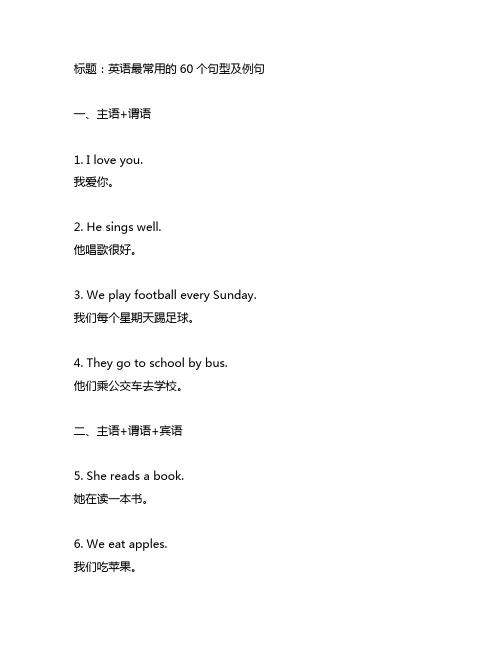
标题:英语最常用的60个句型及例句一、主语+谓语1. I love you.我爱你。
2. He sings well.他唱歌很好。
3. We play football every Sunday. 我们每个星期天踢足球。
4. They go to school by bus.他们乘公交车去学校。
二、主语+谓语+宾语5. She reads a book.她在读一本书。
6. We eat apples.我们吃苹果。
7. He speaks English.他讲英语。
8. They watch TV.他们看电视。
三、主语+谓语+宾语+宾语补足语9. She paints the wall red.她把墙刷成了红色。
10. We call him a hero.我们称他为英雄。
11. He considers the plan unfeasible. 他认为这个计划不可行。
12. They make their father proud.他们让父亲感到自豪。
四、主语+系动词+表语13. I am a teacher.我是一名老师。
14. She was happy.她很快乐。
15. He is my friend.他是我的朋友。
16. They are students.他们是学生。
五、主语+谓语+间宾+直宾17. She teaches us English. 她教我们英语。
18. He bought her a gift. 他给她买了一份礼物。
19. We tell him a story.我们给他讲故事。
20. They show us the way.他们给我们指路。
六、主语+谓语+宾补+宾语21. She made her sister cry.她让她妹妹哭了。
22. They found the problem solved. 他们发现问题已经解决了。
23. He heard the news spread.他听说了消息已经传开了。
英语常用句型100句

英语常用句型100句1. It's a pleasure to meet you. (很高兴见到你。
)2. How are you? (你好吗?)3. What's your name? (你叫什么名字?)4. Where are you from? (你来自哪里?)5. How old are you? (你多大了?)6. Can you speak English? (你会说英语吗?)7. What do you do for a living? (你的职业是什么?)8. How do you spell that? (你怎么拼写那个?)9. What is your favorite food? (你最喜欢的食物是什么?)10. Where do you live? (你住在哪里?)11. What time is it? (现在几点了?)12. Can you help me? (你能帮助我吗?)13. I don't understand. (我不明白。
)14. Could you please repeat that? (你能再重复一遍吗?)15. How much does it cost? (这个多少钱?)16. Where is the nearest bank? (最近的银行在哪里?)17. What's the weather like today? (今天天气怎么样?)18. I'm sorry. (对不起。
)19. Excuse me. (打扰一下。
)20. Do you have any questions? (你有什么问题吗?)21. Nice to meet you. (很高兴认识你。
)22. How do you do? (你好。
)23. What do you think? (你觉得怎么样?)24. Can I help you? (我能帮你吗?)25. What's your favorite color? (你最喜欢的颜色是什么?)26. Where are you going? (你要去哪里?)27. What do you want to do? (你想做什么?)28. How was your day? (你今天过得怎么样?)29. Can you show me on the map? (你能在地图上给我看吗?)30. What's your phone number? (你的电话号码是多少?)31. How long have you been learning English? (你学英语学了多久了?)32. How far is it from here? (离这里有多远?)33. What's your favorite movie? (你最喜欢的电影是什么?)34. Do you have any siblings? (你有兄弟姐妹吗?)35. What's your favorite book? (你最喜欢的书是什么?)36. What's your favorite sport? (你最喜欢的运动是什么?)37. Can I have a glass of water, please? (请给我一杯水。
英语常用句型

常用句型1 There be +主语+doing +地点某地有某人(做某事)There be 的各时态:There is going to be / There will beThere has/have beenThere used to be2 So+ 助动词+主(前提为肯定句)/ Neither+助动词+主(前提为否定句)也一样/也一样不So+ 主+助动词的确如此3 感叹句:What+a/an+adj+名词+主+动词What+adj+名词复数+主+动词How+adj/adv +主+动词4 如此---以致于So+adj/adv+that+句子So+adj+a/an+名词单数+ that+句子So+many/much/little/few+ 名词+ thatSuch+a/an+adj+名词单数+ that/ such+adj+名词复数/不可数名词+that5 无论----No matter+疑问词+主+谓,主+谓6 It 句型:It is +adj/n+for sb to doIt is adj(nice/clever/kind/foolish) of sb to doIt is +V-ed(said/reported/believed) that 据说/报道/有人相信-------It’s +adj(impossible/necessary) thatIt seems that 看上去-------- It seems as if 好像------It’s one’s turn to do sth. 轮到某人做某事It takes sb time to do sth= sb spend time doing sth.It is + 一段时间since 主+动词(过去式)自某动作发生到现在多久It’s+ 一段距离+ from A to B 两点相离多远距离动词(find/make/ feel/ think/ believe)+it adj +(for sb) to doIt will be + 一段时间before +主+一般现在时过多久某事才发生7 主+谓+one of+ the 最高级+名词复数+范围某人/事是最------之一The+比较级+主+谓,the+比较级+(主+谓)越------就越------主+谓+as+形容词原型+as+B A 和B一样-------主+谓+形容词原型+enough (for sb) to do 够------可以------8 否定转移句型:I don’t think/think/ suppose/ imagine/guess+句子我认为-------不含插入语的疑问句:疑问词+do you think/suppose/ guess +主+谓+----?9 祈使句, and/ or+主+ will do10 含有倒装的句型:Only+状语(介词短语/状语从句)+助+主+谓语动词Not only+助动词+主+谓语动词,but also+主+谓语动词不但-------而且------11 问人口句型:What’s the population of -----?12 问价格句型:What’s the price of -------?13 强调句型It is+ 强调部分+that+ 句子其他成分(强调主语是还可用who)14 By the time +主+过去式,主+had +动词过去分词15 做-----的方式the way+主+谓16 地点状语从句where引导主+谓+where+主+谓-----的地方17 if 引导的虚拟语气If主+动词过去式/were+-----,主+would do+------(与现在相反)If主+ had done+-------, 主+would have done+----(与过去相反)练习:用以上句型造句1 外面站着一个人2 明天如果你去,我们也去3 李明擅长弹钢琴。
英语八大句型例句

英语八大句型例句
1. 主+谓:I run every morning.(我每天早上跑步呀。
)
2. 主+谓+宾:You like reading books.(你不是喜欢读书嘛。
)
3. 主+谓+间宾+直宾:He gave me a hug.(他给了我一个大大的拥抱呢。
)
4. 主+谓+宾+宾补:They made the room clean.(他们把房间弄得干干净净的呀。
)
5. 主+系+表:She is very happy.(她可开心啦。
)
6. There be 句型:There are many flowers in the garden.(花园里有好多花儿呀。
)
7. 祈使句:Come here!(快过来呀!)
8. 感叹句:How beautiful the scenery is!(这景色真美啊!)
9. 疑问句:Do you know him?(你认识他不?)
10. 强调句:It is you who made the mistake.(就是你犯的错呀。
)
我的观点结论就是:这些例句是不是很简单易懂呀,大家可以多练习,英语八大句型就能轻松掌握啦!。
英文常用的62个英语句型

英文常用的62个英语句型句型1:There+be +主语+地点状语/时间状语There’s a boat in the river. 河里有条船.句型2:What’s wrong with+sb. / sth. ?What’s wrong with your watch?你的手表有什么毛病?句型3:How do you like...?How do you like China?你觉得中国怎么样?句型4:What do you like about...?What do you like about China?你喜欢中国的什么?句型5:had better(not)+动词原形You’d better ask that policeman over there. 你最好去问问那边的那个警察。
句型6:How+adj. / adv. +主语+谓语!What a/ an+adj. +n. +主语+谓语!How cold it is today !今天多冷啊!What a fine picture it is!多美的一幅图画呀!句型7:Thank+sb. +for(doing)sth.Thank you for coming to see me. 感谢你来看我。
句型8:So+be/ 情态动词/ 助动词+主语He is a student. So am I. 他是一个学生,我也是。
句型9:... not ... until ...He didn’t have supper until his parents came back.直到他的父母回来他才吃饭。
句型10:比较级+and+比较级The baby cried harder and harder. 那孩子哭得越来越厉害。
句型11:the +比较级,the +比较级The more one has,the more one wants. 越有越贪。
句型12:... as +adj./ adv.+as ...…not as(so) +adj. / adv. +as ...Do you think that art is as important asmusic?你认为艺术和音乐一样重要吗?Last Sunday the weather was not so wet as it is today.上个星期天的天气不如今天的天气潮湿。
100句英语常用句型

100句英语常用句型一、表达观点1.In my opinion,...(在我看来……)2.I think...(我认为……)3.As far as I'm concerned,...(就我而言……)4.It seems to me that...(在我看来……)5.I believe...(我相信……)6.From my perspective,...(从我的角度来看……)7.Personally, I feel that...(就个人而言,我觉得……)二、询问意见8.What's your opinion?(你有什么看法?)9.How do you think about it?(你觉得怎么样?)10.What's your view on this matter?(你对这件事有什么看法?)11.Do you have any thoughts on...?(你对……有什么想法吗?)12.Could you give me your opinion on...?(你能给我你对……的意见吗?)三、同意与不同意13.I agree with you.(我同意你的观点。
)14.I couldn't agree more.(我完全同意。
)15.That's exactly what I think.(那正是我所想的。
)16.I'm of the same opinion.(我有同样的看法。
)17.On the contrary, I don't think so.(相反,我不这么认为。
)18.I disagree with you.(我不同意你的观点。
)19.I'm afraid I can't agree.(恐怕我不能同意。
)20.That's not how I see it.(我不是这么看的。
)四、请求帮助21.Could you help me?(你能帮我吗?)22.Would you please do me a favor?(你能帮我个忙吗?)23.Can you give me a hand?(你能帮我一下吗?)24.I need your help.(我需要你的帮助。
英语口语句型大全
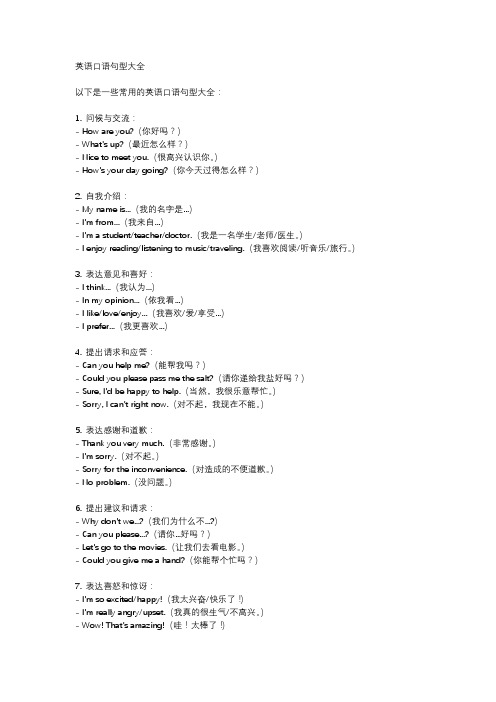
英语口语句型大全以下是一些常用的英语口语句型大全:1. 问候与交流:- How are you?(你好吗?)- What's up?(最近怎么样?)- Nice to meet you.(很高兴认识你。
)- How's your day going?(你今天过得怎么样?)2. 自我介绍:- My name is...(我的名字是...)- I'm from...(我来自...)- I'm a student/teacher/doctor.(我是一名学生/老师/医生。
)- I enjoy reading/listening to music/traveling.(我喜欢阅读/听音乐/旅行。
)3. 表达意见和喜好:- I think...(我认为...)- In my opinion...(依我看...)- I like/love/enjoy...(我喜欢/爱/享受...)- I prefer...(我更喜欢...)4. 提出请求和应答:- Can you help me?(能帮我吗?)- Could you please pass me the salt?(请你递给我盐好吗?)- Sure, I'd be happy to help.(当然,我很乐意帮忙。
)- Sorry, I can't right now.(对不起,我现在不能。
)5. 表达感谢和道歉:- Thank you very much.(非常感谢。
)- I'm sorry.(对不起。
)- Sorry for the inconvenience.(对造成的不便道歉。
)- No problem.(没问题。
)6. 提出建议和请求:- Why don't we...?(我们为什么不...?)- Can you please...?(请你...好吗?)- Let's go to the movies.(让我们去看电影。
常用英语句型
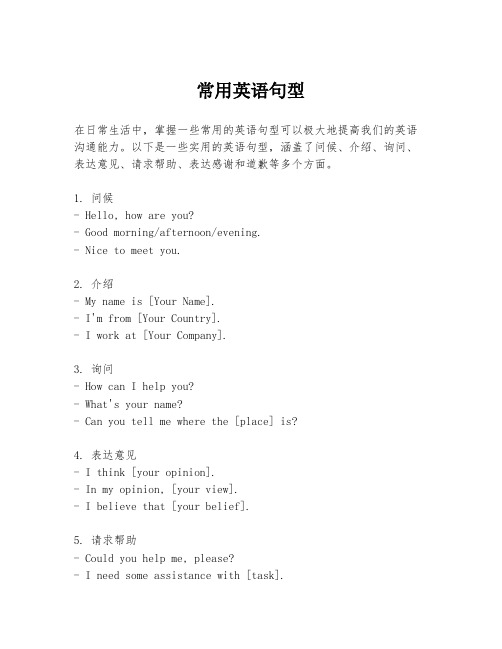
常用英语句型在日常生活中,掌握一些常用的英语句型可以极大地提高我们的英语沟通能力。
以下是一些实用的英语句型,涵盖了问候、介绍、询问、表达意见、请求帮助、表达感谢和道歉等多个方面。
1. 问候- Hello, how are you?- Good morning/afternoon/evening.- Nice to meet you.2. 介绍- My name is [Your Name].- I'm from [Your Country].- I work at [Your Company].3. 询问- How can I help you?- What's your name?- Can you tell me where the [place] is?4. 表达意见- I think [your opinion].- In my opinion, [your view].- I believe that [your belief].5. 请求帮助- Could you help me, please?- I need some assistance with [task].- Would you mind [doing something]?6. 表达感谢- Thank you very much.- I appreciate your help.- Thanks a lot for [what they did].7. 道歉- I'm sorry for [what happened].- I apologize for [your mistake].- Excuse me for [your oversight].8. 邀请- Would you like to [do something]? - Are you free to [do something]?- Let's [do something] together.9. 同意和不同意- I agree with you.- I disagree with your point of view. - That's a good idea.10. 表达喜好- I like [something].- I love [something].- I'm not a big fan of [something].11. 表达需求- I need [something].- I want [something].- I require [something].12. 表达能力- I can [do something].- I'm able to [do something].- I'm capable of [doing something].13. 表达时间- What time is it?- It's [time].- I have to go now.14. 表达地点- Where is [place]?- [Place] is located [directions].- I'm going to [place].15. 表达原因- The reason is [reason].- Because [reason].- Due to [reason].通过学习和练习这些句型,你可以更自信地用英语进行日常交流。
英语常用句型100句
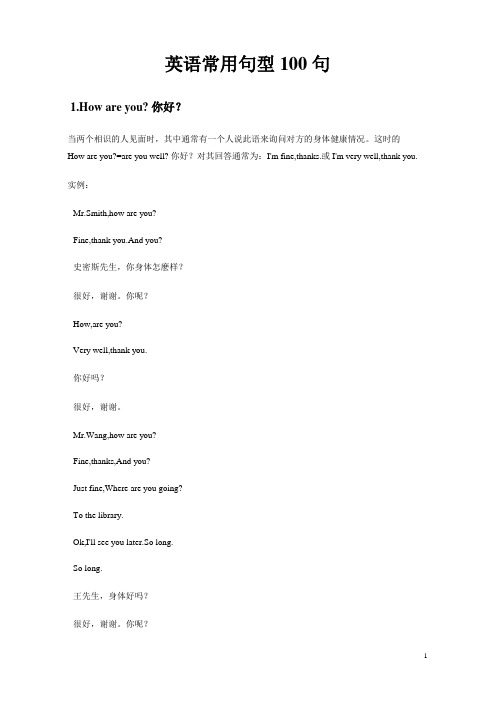
英语常用句型100句1.How are you? 你好?当两个相识的人见面时,其中通常有一个人说此语来询问对方的身体健康情况。
这时的How are you?=are you well? 你好?对其回答通常为:I'm fine,thanks.或I'm very well,thank you.实例:--Mr.Smith,how are you?--Fine,thank you.And you?--史密斯先生,你身体怎麽样?--很好,谢谢。
你呢?--How,are you?--Very well,thank you.--你好吗?--很好,谢谢。
--Mr.Wang,how are you?--Fine,thanks,And you?--Just fine,Where are you going?--To the library.--Ok,I'll see you later.So long.--So long.--王先生,身体好吗?--很好,谢谢。
你呢?--挺好。
你到那儿去?--去图书馆。
--好吧,以后见,再见。
--再见。
2.How is everything with you? 你一切都好吗?此句型表示双方见面后,一方问对方各方面情况,仍为客套话。
类似的说法还有How are things with you? 你一切都好吗?实例:--Hi,Fred!How is everything with you?--Everthing is fine,thank you,What about you?--Quite well.--喂,弗雷德,你好吗?--一切都好,谢谢。
你呢?--很好。
--How are you getting(on,along)with your work?--Very(pretty,quite)well,thank you.--你的工作情况怎样?--很好,谢谢你。
3.Hello! 你好!(喂!)Hello!通常用于以下四种情况:打招呼,打电话,表示惊讶或引起对方的注意。
84个英语基本句型

英语是一门广泛使用的语言,掌握基本句型可以帮助我们有效地表达自己的意思。
下面将介绍84个常用的英语基本句型,希望对大家学习英语有所帮助。
1. 主语 + 动词:I eat.2. 主语 + 动词 + 宾语:She reads books.3. 主语 + 不及物动词:They swim.4. 主语 + 系动词 + 表语:He is happy.5. 主语 + 动词 + 间接宾语 + 直接宾语:She gave me a gift.6. 主语 + 动词 + 宾语 + 宾语补足语:We consider him our friend.7. 主语 + 动词 + 间接宾语 + 直接宾语 + 宾语补足语:They made him their leader.8. 主语 + 动词 + 宾语 + 宾语补足语:He painted the wall red.9. 主语 + 动词 + 宾语 + 间接宾语:She told me a joke.10. 主语 + 不及物动词 + 表语:He became a doctor.11. 主语 + 不及物动词 + 宾语补足语:They elected him president.12. 主语 + 不及物动词 + 宾语 + 宾语补足语:She made him her assistant.13. 主语 + 系动词 + 宾语 + 宾语补足语:I find English interesting.14. 主语 + 系动词 + 表语 + 宾语:She called me a fool.15. 主语 + 系动词 + 宾语 + 宾语补足语:He made me his secretary.16. 主语 + 系动词 + 宾语 + 表语:They named the baby Adam.17. 主语 + 状语 + 动词:We ran quickly.18. 主语 + 状语 + 系动词 + 表语:He felt really tired.19. 主语 + 动词 + 状语:She sings beautifully.20. 主语 + 宾语 + 状语 + 动词:He won the game with great effort.21. 主语 + 宾语 + 状语 + 动词 + 宾语补足语:They elected her president with unanimous support.22. 主语 + 谓语 + 宾语 + 状语:We found the key under the bed.23. 主语 + 谓语 + 宾语 + 状语 + 宾语补足语:She named her daughter Lily out of love for flowers.24. 主语 + 谓语 + 不定式:They want to play.25. 主语 + 谓语 + 动词 + 不定式:He can swim.26. 主语 + 谓语 + 宾语 + 动词 + 不定式:She asked me to help.27. 主语 + 谓语 + 不定式 + 宾语补足语:We believe him to be honest.28. 主语 + 谓语 + 宾语 + 不定式 + 宾语补足语:He wants me to be his assistant.29. 主语 + 谓语 + 不定式 + 状语:You need to study hard.30. 主语 + 谓语 + 动名词:She enjoys swimming.31. 主语 + 谓语 + 宾语 + 动名词:They appreciate her singing.32. 主语 + 谓语 + 动名词 + 宾语补足语:I consider cooking an art.33. 主语 + 谓语 + 不定式 + 动名词:He started to learn painting.34. 主语 + 谓语 + 宾语 + 不定式 + 动名词:She saw him come in.35. 主语 + 谓语 + 宾语 + 不定式 + 状语:We made them stay longer.36. 主语 + 谓语 + 不定式 + 宾语补足语 + 动名词:He wants us to help him finish the project.37. 主语 + 谓语 + 不定式 + 宾语补足语 + 状语:I expect you to arrive on time.38. 主语 + 谓语 + 不定式 + 动名词 + 状语:They will try to solve the problem by working together.39. 主语 + 谓语 + 宾语 + 不定式 + 宾语补足语 + 状语:She persuaded him to stay after school for extra practice.40. 主语 + 谓语 + 分词:He looked tired.41. 主语 + 谓语 + 宾语 + 分词:They found the book interesting.42. 主语 + 谓语 + 分词 + 宾语补足语:We consider him qualified for the job.43. 主语 + 谓语 + 不定式 + 分词:She decided to leave quickly.44. 主语 + 谓语 + 宾语 + 不定式 + 分词:He heard her sing beautifully.45. 主语 + 谓语 + 分词 + 状语:They sat there, waiting for the bus.46. 主语 + 谓语 + 宾语 + 分词 + 状语:We saw her boarding the train.47. 主语 + 谓语 + 分词 + 宾语补足语 + 状语:He walked away, satisfied with his achievement.48. 主语 + 谓语 + 分词 + 不定式:She came running to me to ask a question.49. 主语 + 谓语 + 宾语 + 分词 + 不定式:They saw him standing alone in the rain.50. 主语 + 谓语 + 分词 + 宾语 + 不定式:We watched the movie, hoping to be entertained.51. 主语 + 谓语 + 不定式 + 分词 + 宾语补足语:He wants us to stay focused on our goals.52. 主语 + 谓语 + 不定式 + 分词 + 状语:She needs to finish her homework before going out.53. 主语 + 谓语 + 宾语 + 不定式 + 分词 + 状语:They made him work extra hours to meet the deadline.54. 主语 + 谓语 + 不定式 + 分词 + 宾语补足语:We believe you to have the ability to succeed.55. 主语 + 谓语 + 不定式 + 分词 + 宾语补足语 + 状语:He considered it a great honor to be chosen as the team captain.56. 主语 + 谓语 + 分词 + 状语 + 宾语:They finished the task, exhausted.57. 主语 + 谓语 + 宾语 + 分词 + 状语 + 宾语补足语:She found him standing there, helpless.58. 主语 + 谓语 + 分词 + 宾语 + 状语:He left the room, closing the door behind him.59. 主语 + 谓语 + 分词 + 宾语 + 宾语补足语:We saw her painting the wall red.60. 主语 + 谓语 + 宾语 + 分词 + 宾语补足语 + 状语:They heard him singing in the shower, beautifully.61. 主语 + 谓语 + 分词 + 不定式 + 状语:She stood there, not knowing what to say.62. 主语 + 谓语 + 宾语 + 分词 + 不定式 + 状语:He caught her reading his diary, secretly.63. 主语 + 谓语 + 分词 + 宾语 + 不定式 + 状语:They watched the kids playing happily in the park.64. 主语 + 谓语 + 不定式 + 分词 + 状语 + 宾语补足语:We want you to come prepared for the meeting.65. 主语 + 谓语 + 不定式 + 分词 + 宾语 + 状语:She asked me to stay quiet, not attracting attention.66. 主语 + 谓语 + 分词 + 状语 + 宾语 + 宾语补足语:They arrived at the party late, all dressed up.67. 主语 + 谓语 + 分词 + 宾语 + 状语 + 宾语补足语:I left the office, feeling satisfied with my performance.68. 主语 + 谓语 + 分词 + 宾语 + 宾语补足语 + 状语:He walked away, looking disappointed.69. 主语 + 谓语 + 不定式 + 宾语 + 分词:She wants us to keep the door closed, protecting the animals inside.70. 主语 + 谓语 + 不定式 + 状语 + 分词:They need to finish the project, no matter how hard it is.71. 主语 + 谓语 + 不定式 + 宾语 + 分词 + 状语:We would like you to come over for dinner, if you are available.72. 主语 + 谓语 + 不定式 + 分词 + 状语 + 宾语补足语:He decided to work harder, hoping to achieve better results.73. 主语 + 谓语 + 不定式 + 分词 + 宾语补足语 + 状语:She wanted him to leave, regardless of his apology.74. 主语 + 谓语 + 分词 + 宾语 + 不定式:They saw him running down the street to catch the bus.75. 主语 + 谓语 + 分词 + 不定式 + 宾语:He felt someone touch his shoulder, turning around to see who it was.76. 主语 + 谓语 + 分词 + 宾语 + 不定式 + 宾语补足语:She caught her sister eating her chocolate cake, scolding her for the theft.77. 主语 + 谓语 + 不定式 + 分词 + 宾语 + 状语:They asked me to speak louder, not being able to hear me clearly.78. 主语 + 谓语 + 不定式 + 分词 + 状语 + 宾语补足语:We advised him to approach the problem from a different angle, with the hope of finding a solution.79. 主语 + 谓语 + 不定式 + 宾语 + 分词 + 宾语补足语 + 状语:She reminded him to take his medicine, not forgetting his doctor's advice.80. 主语 + 谓语 + 不定式 + 分词 + 宾语 + 状语 + 宾语补足语:He urged them to apply for the position, fully aware of their qualifications. 81. 主语 + 谓语 + 分词 + 不定式 + 状语 + 宾语 + 宾语补足语:They watched the news report excitedly, hoping to see their favorite celebrity mentioned.82. 主语 + 谓语 + 分词 + 不定式 + 宾语 + 宾语补足语 + 状语:She left the room angrily, slamming the door shut.83. 主语 + 谓语 + 不定式 + 分词 + 状语 + 宾语 + 宾语补足语:We told him to study hard, not wasting his potential.84. 主语 + 谓语 + 不定式 + 分词 + 宾语 + 状语 + 宾语补足语:He encouraged her to believe in herself, never doubting her abilities.这些基本句型涵盖了常见的英语句子结构,掌握它们可以帮助你更好地表达自己的思想和意图。
英语常用句型100句

英语常用句型100句1.I like playing basketball.2.She is a teacher.3.He enjoys listening to music.4.We went to the beach last weekend.5.It will rain tomorrow.6.They are studying hard for the exam.7.I have a dog named Max.8.She doesn’t like coffee.9.He can speak French fluently.10.We should finish this project by the end of the week.11.Are you coming to the party?12.I need to buy some groceries.13.She has a beautiful smile.14.He is always late for meetings.15.We are going on a trip next month.16.It’s too cold outside.17.They have a big house in the mountains.18.I want to learn how to play the guitar.19.She is very good at swimming.20.He likes to read books in his free time.21.We are going to the concert on Saturday.22.Could you pass me the salt, please?23.She is going to the gym after work.24.He doesn’t eat meat.25.We have a test next week.26.I don’t have a car.27.She is going to the store to buy some clothes.28.He is from Australia.29.We are going to have a barbecue in the backyard.30.It’s too hot to go outside.31.They like to go hiking on weekends.32.I need to make a phone call.33.She is going to the library to study.34.He is watching a movie on TV.35.We are going to paint the living room this weekend.36.It’s raining outside.37.They are going on a vacation next month.38.I have a doctor’s appointment tomorrow.39.She is going to the park with her friends.40.He likes to play video games in his free time.41.We need to clean the house before the guests arrive.42.It’s getting dark outside.43.They have a soccer game on Saturday.44.I want to learn how to cook.45.She is listening to music in her room.46.He is going to the basketball game tonight.47.We are going to the beach for the holiday.48.It’s snowing outside.49.They are going to the movies this evening.50.I have a job interview tomorrow.51.She is going to the dentist next week.52.He likes to go fishing on weekends.53.We need to water the plants in the garden.54.It’s getting late, we should go home.55.They have a meeting at work in the morning.56.I want to join a yoga class.57.She is going to the party with her friends.58.He is playing the guitar in the living room.59.We are going to have dinner at a restaurant tonight.60.It’s windy outside.61.They like to go camping in the summer.62.I have a flight to catch tomorrow.63.She is going to the gym to work out.64.He likes to ride his bike to work.65.We are going to visit our grandparents next weekend.66.It’s a beautiful day outside.67.They are going to the zoo with their kids.68.I want to take a cooking class.69.She is going to the beach to relax.70.He is practicing his piano skills.71.We are going to have a picnic in the park.72.It’s a cloudy day.73.They like to go shopping on weekends.74.I have a book club meeting tonight.75.She is going to the spa for a massage.76.He likes to go for a run in the morning.77.We are going to bake cookies this afternoon.78.It’s a sunny day outside.79.They are going to a concert next month.80.I want to learn how to dance.81.She is going to the theater with her friends.82.He is playing basketball with his buddies.83.We are going to have a barbecue in the backyard.84.It’s a rainy day outside.85.They like to go hiking on weekends.86.I have a doctor’s appointment tomorrow.87.She is going to the park with her friends.88.He likes to play video games in his free time.89.We need to clean the house before the guests arrive.90.It’s getting dark outside.91.They have a soccer game on Saturday.92.I want to learn how to cook.93.She is listening to music in her room.94.He is going to the basketball game tonight.95.We are going to the beach for the holiday.96.It’s snowing outside.97.They are going to the movies this evening.98.I have a job interview tomorrow.99.She is going to the dentist next week.100.He likes to go fishing on weekends.以上是英语常用句型100句,希望对大家的英语学习有所帮助。
英语句型16种

6) 比较判断 It is more a picture than a poem.
7) 互斥判断 Either he is right or I am.
3. 祝愿祁使句式
1) 一般句式 Get out of here.
方位
Japan is lies to the east of China.
13. 原因句型
He didn’t go to school because he was ill.
14. 目的句型
He sits in the front in order that he can see words clearly.
2)强语式 Do tell me.
3) 委婉祈使句
Would/Do you mind my smoking?
4)建议祈使句
Let’s not waste the time.
5)祝愿句
May you have a happy marriage.
4. 感叹句型
Here he comes!
5) 择比句
It is better late than never.
6)对比句
You think me idle, but on the contrary, I am busy.
9. 比喻句型
He behaves as his father does.
10. 条件假设句
5)推论条件句
Since that is so, there is no more to say.
62个常用英语句型和例句

62个常用英语句型和例句:1. Subject + used to + verb...意思:表示过去常常做某事,现在不再做了。
I used to play basketball every day.我过去每天打篮球。
She used to get up early.她过去早起。
John used to stay up late.约翰过去经常熬夜。
2. Subject + be used to + verb-ing/noun.意思:表示习惯于做某事或习惯于某物。
She is used to getting up early.她习惯早起。
He is used to the cold weather.他习惯了寒冷的天气。
They are used to working late.他们习惯了工作到很晚。
3. Subject + prefer + noun/verb-ing + to + noun/verb-ing.意思:表示更喜欢做某事而不是另一件事。
I prefer reading to watching TV.我更喜欢阅读而不是看电视。
She prefers tea to coffee.她更喜欢茶而不是咖啡。
They prefer walking to driving.他们更喜欢步行而不是开车。
4. Subject + had better (not) + verb...意思:表示建议最好做某事或不做某事。
You had better finish your homework.你最好完成作业。
She had better not go out tonight.她今晚最好不要外出。
We had better take an umbrella.我们最好带把伞。
5. It seems that...意思:表示似乎,好像。
It seems that he is not coming.他似乎不来了。
It seems that they are busy.他们似乎很忙。
常用英语句型

1. as 句型(1) as引导方式状语从句句型:“按照……;正如……”例:As(it is)in your country, we grow wheat in the north and rice in the south. 正如(像) 你们国家一样,我们北方种植小麦,南方种植水稻。
(2) as+形容词/副词原级+(a /an)+名词+as ;否定式:not as/so --- as例:He is as good a player as his sister.他和他姐姐一样是位优秀的运动员。
(3) such + n. + as to do 如此……以致于……例:She is such a fool as to believe what he said.她是一个如此的一个笨蛋以致相信了他所说的话。
(4) so + adj./adv. + as to do sth 如此……以致于……例:He was so strong as to carry the heavy box.他是如此的强壮以致于能提起那重箱子。
(5) such...as... 象……之类的…… (接名词或定语从句)例:He wished to be such a man as Lei Feng was.他希望成为一个像雷锋这样的人。
(6) the same +名词+as 和……一样的…… (接名词或定语从句)例:He is not the same man as he used to be.他不是从前的那样子了。
(7) as 引导非限制性定语从句例:As is known to us, knowledge is power.众所周知,知识就是力量。
(8)引导时间状语从句,与while意义相近例:We get wiser as we get older.随着我们长大,我们也变得越来越聪明。
(9) 引导原因状语从句,与because的用法相近例:As it was getting very late, we soon turned back.因为越来越迟了,所以我们不久就回来了。
84个英语句式

以下是84个常见的英语句式:1. 主语+ 系动词+ 表语2. 主语+ 不及物动词3. 主语+ 及物动词+ 宾语4. 主语+ 及物动词+ 双宾语5. 主语+ 及物动词+ 复合宾语6. 主语+ 系动词+ 表语(主系表结构)7. 主语+ 谓语(主谓结构)8. 主语+ 谓语+ 宾语(主谓宾结构)9. 主语+ 谓语+ 间接宾语+ 直接宾语(主谓双宾语结构)10. 主语+ 谓语+ 宾语+ 宾补(主谓宾补结构)11. 强调句型:It is/was + 被强调部分+ that/who + 其他部分12. 倒装句型:将句子中的某一部分提前,常见的有全部倒装和部分倒装13. 并列句型:两个或多个简单句,由并列连词连接14. 从属句型:一个从句作主句的宾语、定语或状语等成分,构成主从复合句15. 时态句型:表示动作发生的时间和状态,如现在进行时、过去完成时等16. 被动句型:将动作的承受者作为主语,表示被动关系17. 虚拟语气句型:表示与实际情况相反的情况,或者表达主观愿望和假设情况18. 比较句型:表示比较关系,如比较级、最高级等19. 让步句型:表示尽管存在某种条件,但结果仍然成立的情况20. 原因句型:表示原因或理由,常用于解释某个事实或情况的原因21. 结果句型:表示结果或结论,常用于描述某个行为或情况导致的结果22. 条件句型:表示条件或假设,常用于描述某种条件下的情况或结果23. 目的句型:表示行为的目的或意图,常用于解释某个行为的原因或目的24. 让步从句:表示尽管存在某种条件,但结果仍然成立的情况,常用于从句中25. 原因从句:表示原因或理由,常用于解释某个事实或情况的原因,常用于从句中26. 结果从句:表示结果或结论,常用于描述某个行为或情况导致的结果,常用于从句中27. 时间状语从句:表示时间关系的从句,常用于描述某个行为发生的时间点或时间段28. 条件状语从句:表示条件或假设的从句,常用于描述某种条件下的情况或结果,常用于从句中29. 让步状语从句:表示尽管存在某种条件,但结果仍然成立的情况,常用于从句中30. 比较状语从句:表示比较关系的从句,常用于描述两个事物之间的比较关系,常用于从句中31. 目的状语从句:表示行为的目的或意图的从句,常用于解释某个行为的原因或目的,常用于从句中32. 定语从句:修饰名词或代词的从句,常用于描述事物的性质、特征或属性等,常用于从句中33. 同位语从句:解释说明前面名词的内容、性质、特征等,常用that, what等引导词引导,常用于从句中。
英语常用口语100个母句型

100个常用的英语口语母句型表达观点与看法1. I think… 我认为……- I think it's a great idea. 我认为这是个很棒的主意。
2. In my opinion… 在我看来……- In my opinion, we should go for it. 在我看来,我们应该去争取。
3. As far as I'm concerned… 就我而言……- As far as I'm concerned, it doesn't matter. 就我而言,这没关系。
4. I believe… 我相信……- I believe you can do it. 我相信你能做到。
5. It seems to me that… 在我看来似乎……- It seems to me that something is wrong. 在我看来似乎有些不对劲。
日常问候与寒暄6. How are you? 你好吗?- How are you doing? 你过得怎么样?7. What's up? 怎么了?有什么事吗?- What's new? 有什么新鲜事吗?8. Long time no see. 好久不见。
- It's been a long time. 已经很久了。
9. How's everything? 一切都好吗?- How's your day? 你今天过得怎么样?10. Nice to see you. 很高兴见到你。
- Nice to meet you. 很高兴认识你。
谈论喜好与兴趣11. I like… 我喜欢……- I like reading books. 我喜欢读书。
12. I'm interested in… 我对……感兴趣。
- I'm interested in learning English. 我对学习英语感兴趣。
英语学习常用的62个句型,地道口语
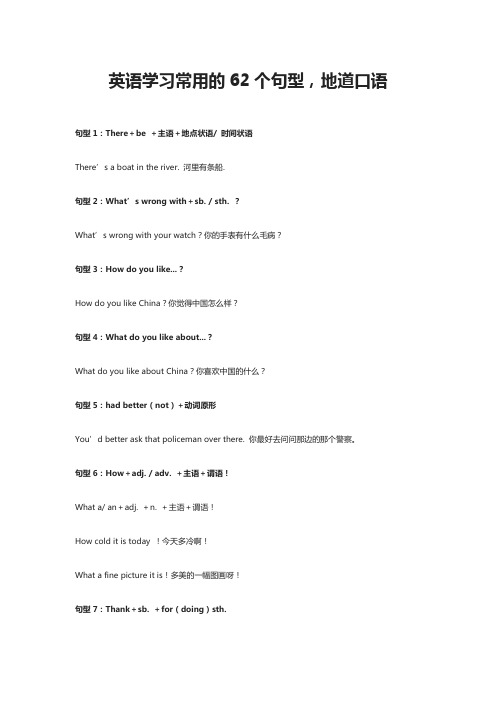
英语学习常用的62个句型,地道口语句型1:There+be +主语+地点状语/ 时间状语There’s a boat in the river. 河里有条船.句型2:What’s wrong with+sb. / sth. ?What’s wrong with your watch?你的手表有什么毛病?句型3:How do you like...?How do you like China?你觉得中国怎么样?句型4:What do you like about...?What do you like about China?你喜欢中国的什么?句型5:had better(not)+动词原形You’d better ask that policeman over there. 你最好去问问那边的那个警察。
句型6:How+adj. / adv. +主语+谓语!What a/ an+adj. +n. +主语+谓语!How cold it is today !今天多冷啊!What a fine picture it is!多美的一幅图画呀!句型7:Thank+sb. +for(doing)sth.Thank you for coming to see me. 感谢你来看我。
句型8:So+be/ 情态动词/ 助动词+主语He is a student. So am I. 他是一个学生,我也是。
句型9:... not ... until ...He didn’t have supper until his parents came back. 直到他的父母回来他才吃饭。
句型10:比较级+and+比较级The baby cried harder and harder. 那孩子哭得越来越厉害。
句型11:the +比较级,the +比较级The more one has,the more one wants. 越有越贪。
英语十四个句型
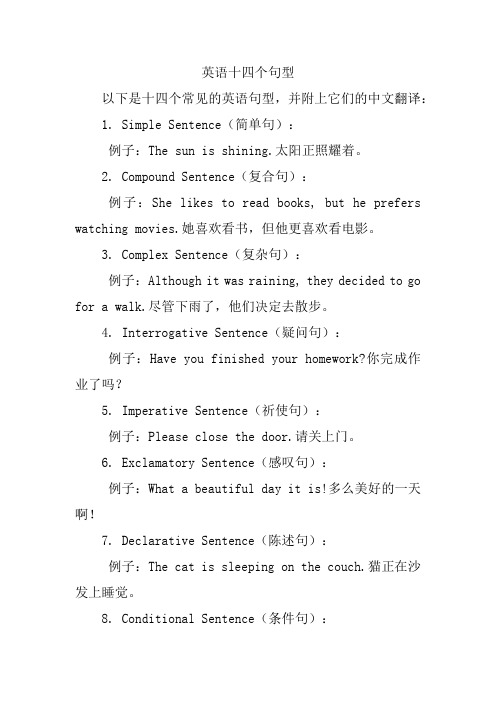
英语十四个句型以下是十四个常见的英语句型,并附上它们的中文翻译:1. Simple Sentence(简单句):例子:The sun is shining.太阳正照耀着。
2. Compound Sentence(复合句):例子:She likes to read books, but he prefers watching movies.她喜欢看书,但他更喜欢看电影。
3. Complex Sentence(复杂句):例子:Although it was raining, they decided to go for a walk.尽管下雨了,他们决定去散步。
4. Interrogative Sentence(疑问句):例子:Have you finished your homework?你完成作业了吗?5. Imperative Sentence(祈使句):例子:Please close the door.请关上门。
6. Exclamatory Sentence(感叹句):例子:What a beautiful day it is!多么美好的一天啊!7. Declarative Sentence(陈述句):例子:The cat is sleeping on the couch.猫正在沙发上睡觉。
8. Conditional Sentence(条件句):例子:If it rains, we will stay indoors.如果下雨,我们会呆在室内。
9. Passive Voice Sentence(被动语态句):例子:The cake was baked by Mary.蛋糕是玛丽烤的。
10. Direct Speech Sentence(直接引语句):例子:She said, "I will be there at 5 o'clock."她说:“我会在5点钟到那里。
- 1、下载文档前请自行甄别文档内容的完整性,平台不提供额外的编辑、内容补充、找答案等附加服务。
- 2、"仅部分预览"的文档,不可在线预览部分如存在完整性等问题,可反馈申请退款(可完整预览的文档不适用该条件!)。
- 3、如文档侵犯您的权益,请联系客服反馈,我们会尽快为您处理(人工客服工作时间:9:00-18:30)。
高中作文常用句型一、根据衔接词本身在文章中起到的作用,主要分为以下四类,即“起”、“承”、“转”、“合”。
(一)表示“起”的词/词组:用于开篇引出扩展句。
at first 最初 for one thing…(for another) first(ly)第一at present 现在;当今首先…(其次)…currently 目前;最后recently 最近 lately 最近in general 一般说来in the beginning 起初one the one hand…(on the other hand)to begin with 首先;第一一方面…(另一方面) first of all 首先;第一generally speaking 一般地说in the first place 首先;第一on the whole 总起来说to start with 首先;第一presently 现在;此刻(二)有关“承”的常用词语:用来承接上文。
after/after that/afterwards此后by this time 此时after a few days 几天以后certainly 无疑地;当然地after a while过了一会儿therefore 因此;结果also/too 并且;又for example 例如at the same time 同时for instance 例如beside 此外for this purpose 为了这个目的Besides/what,s more 而且;此外from now on 从此in addition 此外second 第二;第二点in addition to…除…之外secondly 第二in fact 事实上similarly 同样地in other words 换句话说in particular 特别(地)soon 不久in the same way 同样地still 仍然by the way 顺便提一句then 然后indeed 的确meanwhile 与此同时thirdly 第三moreover 而且,此外for another 其次no doubt 无疑地such as 正如obviously 明显地 later 后来of course当然truly 事实上;真实地particularly特别地unlike …不像……;和……不同what is more 而且;此外(三)有关“转”的常用词语:用来表示不同或相反的意见。
after all 毕竟 fortunately 幸运地all the same 依然;照样however 然而;无论如何anyway 无论如何in spite of 尽管……;虽然……at the same time同时;然而luckily 幸运地by this time 此时though/although 尽管no doubt 无疑地in/by contrast 对比之下on the contrary 相反地even though即使otherwise 否则unfortunately 不幸地in fact 事实上unlike 不像……;和……不同as a matter of fact 事实上yet仍;然而;但是especially 特别地(四)有关“合”的常用词语:用于小结上文或结束本段落的内容。
above all 最重要的是as a result结果in sum 总之,简而言之as has been noted 如前所述in summary 简要地说as I have said 如我所述on the whole 总体来说;整个看来开头用语1.议论论文:A. Just as every coin has two sides, cars have both advantages and disadvantages.B. Compared to/ In comparison with letters, e-mails are more convenient.C. When it comes to computers, some people think they have brought us a lot of conv enience. However,...D. Opinions are divided on the advantages and disadvantages of living in the city and in the countryside.E. As is known to all/ As we all know, computers have played an important role/part i n our daily life.F. Why do you go to university? Different people have different points of view.2.书信:A. I am writing to you to apply for admission to your university as a visiting scholar.B. I read an advertisement in today’s China Daily and I apply for the job...C. Thank you for your letter of May 5.D. How happy I am to receive your letter of January 9.E. How nice to hear from you again.常用句型(一)段首句1. 关于……人们有不同的观点。
一些人认为……There are different opinions among people as to……Some people suggest that ……2. 俗话说(常言道)……,它是我们前辈的经历,但是,即使在今天,它在许多场合仍然适用。
There is an old saying……It's the experience of our forefathers,however,it is correct in many cases even today.3. 现在,……,它们给我们的日常生活带来了许多危害。
首先,……;其次,……。
更为糟糕的是……。
Today, …… which have brought a lot of harms in our daily life. First, …… Second,……What makes things worse is that…….4. 现在,……很普遍,许多人喜欢……,因为……,另外(而且)……。
Nowadays,it is common to ……. Many people like …… because …… Besides,……5. 任何事物都是有两面性,……也不例外。
它既有有利的一面,也有不利的一面。
Everything has two sides and …… is not an exception,it has both advantages and disadvantages.6. 关于……人们的观点各不相同,一些人认为(说)……,在他们看来,……People’s opinions about …… vary from person to person. Some people say that ……To them,……7. 人类正面临着一个严重的问题……,这个问题变得越来越严重。
Man is now facing a big problem …… which is becoming more and more serious. 8. ……已成为人的关注的热门话题,特别是在年青人当中,将引发激烈的辩论。
……has become a hot topic among people,especially among the young and heated debates are right on their way.9. ……在我们的日常生活中起着越来越重要的作用,它给我们带来了许多好处,但同时也引发一些严重的问题。
……has been playing an increasingly important role in our day-to-day life.it has brought us a lot of benefits but has created some serious problems as well.10. 根据图表/数字/统计数字/表格中的百分比/图表/条形图/成形图可以看出……。
很显然……,但是为什么呢? According to the figure/number/statistics/percentages in the /chart/bar graph/lin e/graph,it can be seen that……while. Obviously,……but why?(二)中间段落句1. 相反,有一些人赞成……,他们相信……,而且,他们认为……。
On the contrary,there are some people in favor of……t the same time,they say……2. 但是,我认为这不是解决……的好方法,比如……。
最糟糕的是……。
But I don't think it is a very good way to solve …….For example,……Worst of all,…….3. ……对我们国家的发展和建设是必不可少的,(也是)非常重要的。
首先,……。
而且……,最重要的是…………is necessary and important to our country's development and construction. First,……What's more, ……Most important of all,……4. 有几个可供我们采纳的方法。
首先,我们可以There are several measures for us to adopt. First, we can……5. 面临……,我们应该采取一系列行之有效的方法来……。
一方面……,另一方面, Confronted with…we should take a series of effective measures to……. For one thin g,For another,6. 早就应该拿出行动了。
